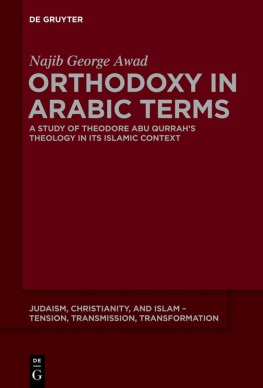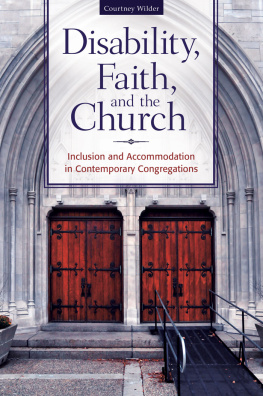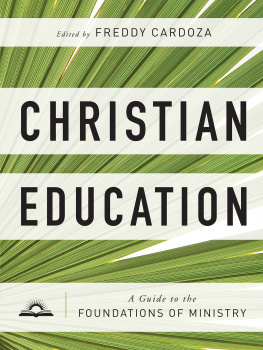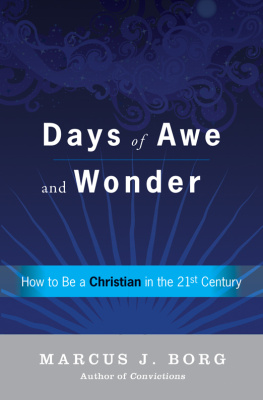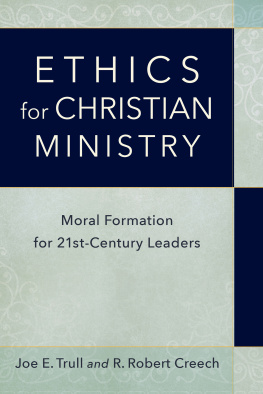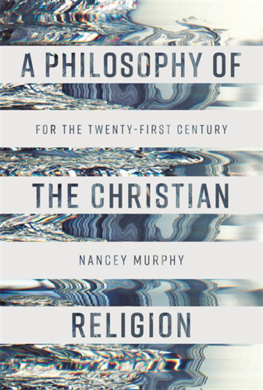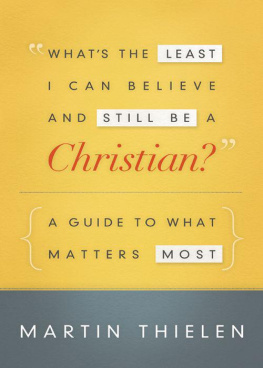Being Christian in the Twenty-First Century
Sam Gould
Foreword by Robert H. King
Foreword by Rodney Noel Saunders
Being Christian in the Twenty-First Century
Copyright 2017 Sam Gould. All rights reserved. Except for brief quotations in critical publications or reviews, no part of this book may be reproduced in any manner without prior written permission from the publisher. Write: Permissions, Wipf and Stock Publishers, 199 W. 8th Ave., Suite 3, Eugene, OR 97401.
Wipf & Stock
An Imprint of Wipf and Stock Publishers
W. th Ave., Suite
Eugene, OR 97401
www.wipfandstock.com
paperback isbn: 978-1-5326-1969-4
hardcover isbn: 978-1-4982-4619-4
ebook isbn: 978-1-4982-4618-7
Manufactured in the U.S.A. August 9, 2017
All biblical quotations are taken from the New Revised Standard Version Bible , copyright 1989 , by the Division of Christian Education of the National Council of the Churches of Christ in the United States of America.
For our eight grandchildren,
Marissa
Timothy
Grace
Travis
Nicholas
Tyler
Emily
&
Katelyn,
who will face their adult journey in the twenty-first century.
The aim of the church is not to enlist its laymen in its services; the aim of the church is to put laymen as theological competents in the service of the world!
Carlyle Marney, Priests to Each Other
Foreword
C hristians are challenged today as never before to examine their faith in order to make it their own.
Being Christian in the Twenty-First Century is an engaging, down to earth exploration of the meaning of Christian faith by someone grounded in the traditional teachings of the church, but viewed from a critical, present day perspective.
Sam Goulds background is business education and his questions are those of someone with a practical point of view, yet he is knowledgeable about current biblical and theological scholarship and skillful at relating what he has learned to the concerns of ordinary folks. This book grows out of his extensive experience teaching discussion classes for thoughtful, inquiring adults in a variety of denominational settings. It is not at all dogmatic and should provide a useful spring board for lively discussion.
For anyone seeking a contemporary understanding of Christian belief, I heartily recommend it.
Robert H. King, PhD
Dean Emeritus
Millsaps College
Foreword
H ow many lay people and clergy have serious concerns about the continuing decline in the numbers of people participating in Christian churches? How many of those think that decline is mostly or partly because of the churchs refusal to consider newer and different biblical and theological perspectives that are relevant to the twenty-first century, most especially because of the daily increase in the acceptance and use of science and technology? How much will the lack of interest and involvement in the church from the strong majority of millennials, the largest generation ever born in the US, affect the future life and vitality of the church? How long will the church believe and think that it can keep doing what it has always done, but somehow get different results? Is it possible God is seeking to have people in the church consider some exciting and new and different ways? What if there was a book that helped Sunday School or other adult classes begin to consider and discuss these and other such questions, which could lead to dialogue that could help the church make needed changes? What if it was this book you are now holding and reading?
Sam Gould is a layperson who has thought a great deal about these questions, because he cares deeply about how the church is and isnt relating to the realities of the twenty-first century. His book is specifically designed to help laypersons and clergy begin to not only ask these essential questions, but also discuss them in ways that could enable and empower the changes essential for the future life and vitality of the church. He brings a college professors ability, intelligence, and inquisitiveness to this book. You will be so very glad that you have purchased this book and started a faith journey of essential significance toward the development of ideas and actions that can help change the future of the church. May you not only enjoy the journey, but also the meaningful, enabling learnings that you experience.
Rodney Noel Saunders
United Methodist Pastor, Retired
Preface
Happy is the person who meditates on wisdom and reasons intelligently, who reflects in his heart on her ways and ponders her secrets.
Sir 14:2021
C hristianity is ubiquitous in the United States and in other pockets of the world. It comes in many sizes, flavors, packages, and intensities. This is not the case in much of Europe where Cathedrals built for the masses remain largely vacant during Sunday services. In the United States many people are brought up in a faith culture and remain in it throughout their lives. But others find the religion of their childhood no longer suitable or compatible with their life experiences and fundamental world view. And so, people are leaving the church at a rapid pace. Are we as a nation following Europes lead and turning away from our Christian roots?
In May of 2015 the Pew Foundation released a report chronicling the decline in Christian affiliation in the United States. The report indicates that between 2007 and 2014 the Christian share of the population declined from . percent to . percent. Further, those who identify as unaffiliated, have grown from . percent to . percent of the populationan increase of nearly percent in just seven years. Even many of the expanding nondenominational evangelical congregations are failing to keep pace with population growth. In absolute numbers Mainline Protestant and Catholic denominations have declined . percent and . percent, respectively, over this reporting period. Faced with these daunting statistics one must ask, Is there something wrong with the church?
Perhaps one should ask if church affiliation is destined to be a relic of the past. Perhaps the church has served a purpose, but outlived its usefulness. Over the centuries the church has attended to the needs of the poor, the sick, and the uneducated. They have provided relief for orphans and widows. They have built hospitals, schools, and universities. But many of these functions have been taken over by local, state, and federal governments. Many of the fine colleges and universities with religious origins have since separated themselves from their founding bodies. With secular governing bodies now fulfilling many of these societal roles what is the churchs role? Is it to focus on personal salvation while perpetuating the existing culture? Is it to give us space, perhaps an hour each week, to enter into a simpler time? Is it to entertain and make us feel good? If these are the case then perhaps the church has outlived its usefulness.
Many Christians uncritically accept church teaching and do not try to reconcile them with their experience outside of their religious life. That works just fine for many people. Yet, for many others their fundamental religious beliefs must coincide with how they understand the world works. For those people, among whom I count myself, there must be both head and heart. For these people, faith is most robust when the thought process behind it is sound and credible. Yet for many, ancient church dogma, doctrine, and creeds leave them incredulous. Perhaps it is the time for reform and renewal in the church. I personally believe that the church has an important ethical, empowering, and healing role to play in the twenty-first century. But, in order to do so it needs to focus on the character of its message. That means it must be intellectually satisfying as well as a place of comfort, fellowship, and service, a place where empathy and compassion are acted out consistent with the teachings of Jesus.


